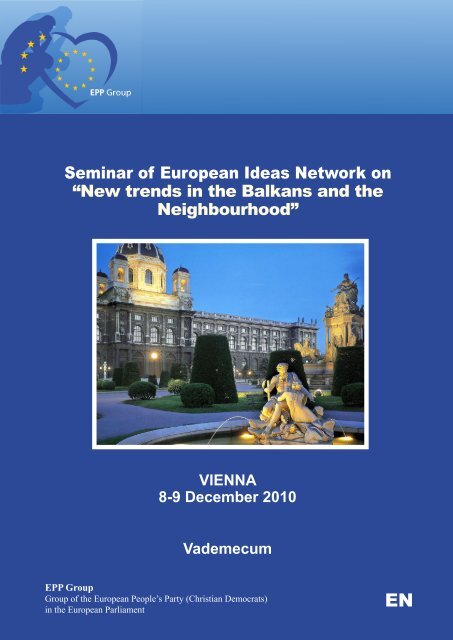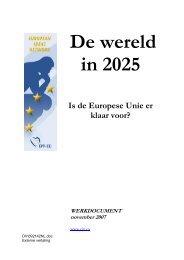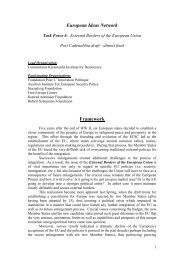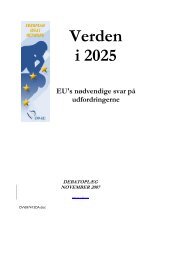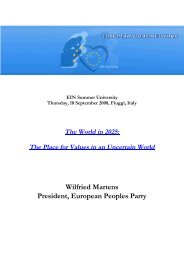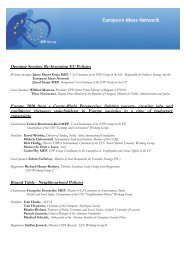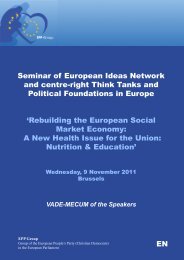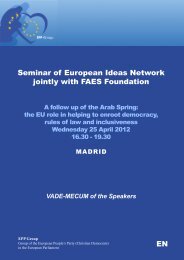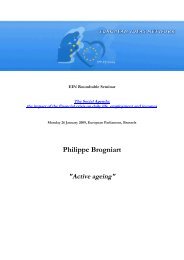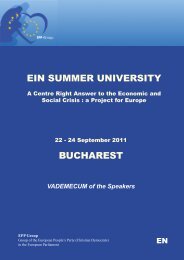Vademecum - European Ideas Network
Vademecum - European Ideas Network
Vademecum - European Ideas Network
Create successful ePaper yourself
Turn your PDF publications into a flip-book with our unique Google optimized e-Paper software.
Service Documentation - Publications - Recherche<br />
Seminar of <strong>European</strong> <strong>Ideas</strong> <strong>Network</strong> on<br />
“New trends in the Balkans and the<br />
Neighbourhood”<br />
VIENNA<br />
8-9 December 2010<br />
<strong>Vademecum</strong><br />
EPP Group<br />
Group of the <strong>European</strong> People’s Party (Christian Democrats)<br />
in the <strong>European</strong> Parliament<br />
EN
2<br />
<strong>European</strong> <strong>Ideas</strong> <strong>Network</strong>
<strong>European</strong> <strong>Ideas</strong> <strong>Network</strong><br />
EIN Seminar : Vienna, 8-9 December 2010<br />
Seminar of <strong>European</strong> <strong>Ideas</strong> <strong>Network</strong> on<br />
“New trends in the Balkans and the Neighbourhood”<br />
Vienna, 8-9 December 2010<br />
3
4<br />
<strong>European</strong> <strong>Ideas</strong> <strong>Network</strong>
<strong>European</strong> <strong>Ideas</strong> <strong>Network</strong><br />
EIN Seminar : Vienna, 8-9 December 2010<br />
Albert ENGELICH, Deputy Director for Economic Relations with Eastern <strong>European</strong> and Central Asian countries at the Austrian<br />
Ministry for Foreign Affairs<br />
Born in 1965 and entered the Ministry in 1994<br />
From 1996-1999 I was posted at the Austrian Permanent Representation in Brussels.<br />
From 1999-2002 and from 2002-2005 I was posted at the Austrian Embassy in Paris.<br />
Radko HOKOVSKY, President of the <strong>European</strong> Value <strong>Network</strong><br />
Radko Hokovsky serves as a Chairman of the association <strong>European</strong> Values o.s. and has worked<br />
as its Executive Director since July 2007. He has co-found and since 2005 volunteered for the<br />
Association for <strong>European</strong> Values gradually as a project manager, coordinator of international cooperation<br />
and executive secretary. In 2006 he led the development of the <strong>European</strong> Values <strong>Network</strong><br />
programme and become its president. Currently he is a PhD candidate at the Department for International<br />
Relation of the Charles University in Prague. He holds a Master of <strong>European</strong> Studies<br />
degree from the Centre for <strong>European</strong> Integration Studies (ZEI) at the University of Bonn, and<br />
Bachelors Degree in Politics and International Relations from Charles University in Prague. He<br />
had completed a quarterly internship in the <strong>European</strong> Parliament in 2005. He has also attended the<br />
Robinson-Martin Security Scholars Program at the Prague Security Studies Institute in 2004. He<br />
has been member of the <strong>European</strong> Youth Parliament in the Czech Republic since 2002, and the Association for International Affairs<br />
(AMO) for which he volunteered in 2003-2005. He focuses on issues of <strong>European</strong> integration, especially decision-making<br />
processes and role of the <strong>European</strong> political parties.<br />
Gerhard JANDL, Federal Ministry of Foreign Affairs, Security Policy Director at the<br />
Austrian MFA, former Ambassador to Serbia<br />
Born on 30 April 1962 in Döbling, Austria.<br />
Studies of Law and of Economics<br />
Doctor of Law (Vienna University), Bachelor of Economics (Graz University)<br />
Diplomatic Career:<br />
• Currently: Ministry for Foreign Affairs, Vienna. Security Policy Director<br />
• February 2005 – September 2008: Austrian Ambassador to Serbia (Serbia-Montenegro, resp.)<br />
• July 2000 – February 2005: Austrian Ambassador to Bosnia-Herzegovina, August 2003 –<br />
February 2005 Dean of the Diplomatic Corps<br />
• October 1995 – July 2000: Ministry for Foreign Affairs, Vienna. Head of the Western Balkans Division in the Political<br />
Directorate-General.<br />
• 1 July - 31 December 1998 (Austrian EU Presidency): Chairman of the EU/CFSP Working Group on Former Yugoslavia<br />
(COWEB).<br />
• June 1993 - September 1995:,Austrian Embassy in Tunis.,Deputy Chief of Mission. In charge of the political relations with<br />
PLO Headquarters in Tunis.<br />
• April 1989 - June 1993: Austrian Mission to the United Nations in New York. January 1991 - December 1992 (Austrian<br />
Membership in the Security Council): Austrian delegate to the Security Council, in charge of Iraq/Kuwait, Libya, Western<br />
Sahara, Former Yugoslavia.<br />
• January 1988 - April 1989: Ministry for Foreign Affairs, Vienna, Legal Department.<br />
• June 1987 - January 1988: Austrian Embassy in Cairo.<br />
• June 1986 - June 1987: Ministry for Foreign Affairs, Vienna. Departments for International Conferences, and for Bilateral<br />
Economic Relations, resp.<br />
5
6<br />
Staffan JERNECK, Director CEPS Brussels, EIN Working Group 8<br />
Staffan Jerneck, economist, is Director and Director of Corporate Relations of CEPS, which<br />
is a leading Brussels-based politically independent and influential <strong>European</strong> think tank having<br />
excellent networks and contacts with the EU Commission, the Council of Ministers, the <strong>European</strong><br />
Parliament, business executives, diplomats, politicians and other strategic decision makers. CEPS<br />
has a strong influence in the EU as it anticipates important trends and issues. Jerneck is in charge of<br />
the corporate sector with 120 international companies as corporate members - the major financial<br />
contributor to CEPS – and the programmes. He is substantially involved in policy shaping. 1986 to<br />
1997 Secretary General and Director General of the Swedish International Chamber of Commerce<br />
(ICC). During his period, the Swedish ICC became the biggest in the world in terms of members.<br />
ICC is the world business organisation representing international business in 140 countries.<br />
Staffan Jerneck was assistant to the CEO of the Federation of Swedish Industries - the major lobbying organisation for industry.<br />
He was secretary of the Boards of the Federation and the General Export Association of Sweden. Staffan Jerneck has during<br />
his professional career always worked in organisations based on corporate membership which has given him a longstanding<br />
experience in relation with business members. He has established a wide international network of corporate executives, diplomats,<br />
representatives of the EU institutions and other policy makers and is an excellent net-worker. Bachelor of Arts, University of<br />
Lund, Sweden, 1968. Master of Arts in Economics, University of California at Los Angeles, UCLA, USA, 1970.<br />
Thomas KLEININGER, Executive Director, Institutul de Studii Populare (ISP - Bucharest)<br />
• 2010 - present Institute for Popular Studies Executive director<br />
• 2006-2010 Romanian Chamber of Commerce and Industry Director, PR-Departement<br />
• 2002-2006 Program coordinator Friedrich Naumann Foundation<br />
• 1999-2002 Institute for Liberal Studies Director<br />
• 1997-1999 UNDP “Poverty Alleviation II” National Project Manager<br />
• 1997-1998 Ministry of Culture, “Romania - Special Guest at the Leipzig Book-fair” Project Manager<br />
• 1994-1997 RAO Intl. Publishing House Director<br />
• 1991-1994 Humanitas Publishing House Director<br />
• 1988-1991 Institute for History and Theory of Fine Arts Scientific Researcher<br />
• 1970-1988 Polytechnic Institute for Oil and Gas, Foreign Languages Chair Lecturer<br />
Education and Training<br />
• 2000 Summer Academy, Bonn: EU-Enlargement, special courses on CFSP<br />
• 2000 National College for Defense<br />
• 1993-1995 University of Sankt-Gallen, Switzerland<br />
• 1992 Bucharest, C.I.S.A<br />
• 1965-1970 University Bucharest, Foreign Languages Faculty, German and English Language<br />
• Graduated in Philology<br />
Matti MAASIKAS, Advisor at BEPA, <strong>European</strong> Commission<br />
Matti Maasikas graduated the University of Tartu, Estonia, as a historian in 1993. In 1994 he took part<br />
in the Internship Programme of the German Bundestag. From 1994 to 1996 he worked as International<br />
Secretary of the Pro Patria Union (Estonian Conservative Party). Between 1996 and 1999 he held the<br />
position as the Head of Foreign Relations Department in the Chancellery of the Estonian Parliament.<br />
In 1999 he became the Head of Cabinet of Prime Minister Mart Laar. From 2001 to 2005 he worked<br />
as Estonian Ambassador to Finland. In 2005 he was nominated to the post of Secretary General of the<br />
Estonian Foreign Ministry.<br />
In January 2009 he joined the Cabinet of Enlargement Commissioner Olli Rehn in the <strong>European</strong> Commission. In May 2010 he joined<br />
BEPA to work on Russia, Ukraine, Caucasus and Balkans regions as well as the relations between EU and NATO.<br />
<strong>European</strong> <strong>Ideas</strong> <strong>Network</strong>
<strong>European</strong> <strong>Ideas</strong> <strong>Network</strong><br />
EIN Seminar : Vienna, 8-9 December 2010<br />
Per NORMARK, Politico-Military Adviser to the <strong>European</strong> Union Special Representative in<br />
Bosnia and Herzegovina and Chief/EU Political Adviser to COM EUFOR.<br />
Name: Per Normark<br />
Age: 45 y.o.<br />
Professional experience<br />
July 2006 – present: Politico-Military Adviser to the <strong>European</strong> Union Special Representative in<br />
Bosnia and Herzegovina and Chief/EU Political Adviser to COM EUFOR.<br />
- Advising EUSR on military and security issues pertinent to EU political co-ordination and BiH and ensure co-ordination of<br />
information pertaining to BiH political analysis from and between relevant information resources in EUFOR and the EUSR office.<br />
- Key role in supporting the coordination of EU/CSDP actors in BiH. Support effective liaison and coordination between General<br />
Secretariat of the Council of the EU (CMPD), COM EUFOR and EUSR.<br />
- Providing COM EUFOR with political guidance on military issues with a local political dimension, in particular concerning sensitive<br />
operations, relations with local authorities and relations with the local media, while advising EUSR on political actions that may have<br />
an impact on the security situation.<br />
- Coordinating EUFOR’s involvement in Security Sector Reform with the EUSR office.<br />
- January 2006 – June 2006: Counsellor/Political Adviser in ISAF/PRT Mazar-e-Sharif, Afghanistan.<br />
- June 2002 – July 2005: Human Dimension Officer at the OSCE Centre in Tashkent, Uzbekistan.<br />
- September 2001 – May 2002: OSCE Spillover Monitor Mission to Skopje.<br />
- November 1998 – May 2000: Human Rights Officer at the OSCE Mission to Georgia.<br />
- September 1997 – September 1998: Military Observer with United Nations Observer Mission In Georgia, UNOMIG.<br />
1985 – 1996: Professional officer in the Swedish Army.<br />
Education<br />
- 1997: Graduated from Stockholm University with a master degree in social science with a major in political science. Specialised in<br />
East <strong>European</strong> and Russian security studies. Also studied business administration, economics and law.<br />
- 1994: Promoted to captain in the Swedish Army.<br />
Publications<br />
- “Russian Policy Towards Georgia – Assertiveness and Strategic Retreat”: in Sabahi, F. and Warner, D., eds., (2004) The OSCE and<br />
the Multiple Challenges of Transition – The Caucasus and Central Asia, Ashgate.<br />
- “Abkhazia – time for Conflict Resolution” conference paper posted at the web-site of the Second METU Conference on International<br />
Relations, June 2003, http://www.ir.metu.edu.tr.<br />
- “Time is Ripe for Russian Policy Change towards Georgia”: in Perihelion, 17-23 February 2003, http://www.erpic.org.<br />
- “Russia’s Policy vis-à-vis Georgia – Continuity and Change”: Scientific Report, Stockholm:The Swedish Defence ResearchAgency,<br />
August 2001, http://www.foi.se.<br />
- “Successful Third Party Interventions in Post-Soviet Conflicts – A Case Study of South Ossetia and Transdniester”: Master Thesis,<br />
Linköping University, Tema Institution, Department for Political Science, 1997.<br />
Conferences<br />
- “Russian Threat Perception in the Caucasus”, presented at the Central Eurasian Studies Society Annual Conference, Harvard, 2-5<br />
October 2003, http://cess.fas.harvard.edu.<br />
- “Abkhazia – time for Conflict Resolution”, presented at the Second METU Conference on International Relations in Ankara on 24-26<br />
June 2003, http://www.ir.metu.edu.tr.<br />
- “Russian Policy Towards Georgia – Assertiveness and Strategic Retreat”, presented at a conference on “The OSCE and the Multiple<br />
Challenges of Transition” at the Graduate Institute of International Studies, Geneva, on 6-7 December 2001.<br />
7
8<br />
Andreas RAAB, Member of the Executive Board, OHRID Institute for Economic<br />
Strategies and International Affairs<br />
Family name: Raab<br />
First names: Andreas<br />
Date of birth: 21. December 1962<br />
Nationality: German<br />
Civil status: Single<br />
Education: M A in history and political sciences<br />
Institution<br />
1969-1982, Ulm, Germany : Primary and secondary school with high school diploma of Kepler Gymnasium Ulm University<br />
of Konstanz (Germany)<br />
1983-1989 : Studies of early modern history and modern history<br />
1985-1990 : Studies of political sciences/ public administration<br />
1993 : M A in history and political sciences “with grade good”<br />
- Membership of professional bodies: member of the advisory board of the Macedonian Minister of Foreign Affaires. -<br />
Executive board member of the Skopje based Ohrid Institute for Economic Strategies and International Affaires.<br />
- Other skills: Computer skills (micro soft office, power point)<br />
- Present position: advisor to the Macedonian minister of Foreign Affaires, expert in a political consultancy for the<br />
Ohrid institute for economic strategies and international relations<br />
- Years within the firm: 4<br />
- Key qualifications: profound knowledge of multiethnic societies, Political parties, elections, and Local Government<br />
issues, election legislation reforms, organising elections in countries in transition, election monitoring, work of election<br />
authorities ,decentralization reform and transfer of competences between different levels of government, design<br />
and supervision of pilot projects with interethnic background/participation of minorities, facilitation of dialogue between<br />
political parties and between municipalities and the government in conflict and post conflict situation. Inclusion<br />
of civil society / NGO in reform process and political processes.<br />
Professional experience<br />
- Nov 2008 : Skopje, Ohrid institute /convincet, Project expert/political analyst<br />
- 02.04.08- 18.05.08 : Belgrade, OSCE-ODIHR, Election Observation Mission to Serbia, Political analyst<br />
- 1.03.07 : Skopje, Ohrid institute for economic strategies and international relations, Executive board<br />
- 1.08-15.9.06 : Podgorica, OSCE-ODIHR, Election Observation Mission to Montenegro, Political analyst<br />
- 1.03. 2006-31.07.2006 : Skopje, OSCE-Spillover Monitor Mission to Skopje, Project expert<br />
- 7.04. 1998 – 31.12. 2005 : Skopje, OSCE – Spillover Monitor Mission to Skopje; Senior political advisor – chief<br />
political reporting department<br />
- April –June 1997 : Livno, Doboij OSCE – Mission Bosnia and Herzegovina, Registration & Election supervisor<br />
- July- August 1997 : Belgrade, IOM Belgrade<br />
- September 1997 : Mostar, OSCE Mission Bosnia and Herzegovina<br />
- December 1997: Doboij<br />
- 1995-1996: Ulm, Bosnien und Kroatien Hilfe NGO, Manager<br />
- 1990 - 1994: Ulm, Office of Karin Jeltsch Member of German Parliament, assistant<br />
Other relevant information (eg, Publications)<br />
Author of 2 books :<br />
1. Opfer, Taeter, Tatenlose ; Der Krieg in Kroatien und Bosnien- Herzegowina Ulm 1995<br />
2. Makedonien – Reiches, armes Land Ulm 1997<br />
<strong>European</strong> <strong>Ideas</strong> <strong>Network</strong>
<strong>European</strong> <strong>Ideas</strong> <strong>Network</strong><br />
EIN Seminar : Vienna, 8-9 December 2010<br />
Manfred SCHEICH, Ambassador of the Austrian Institute for <strong>European</strong> Security Policy<br />
Manfred Scheich studied International Business in Vienna and holds a Doctor degree of the<br />
Vienna University of Economics and Business Administration In his diplomatic career he was<br />
appointed Austrian Ambassador to Algeria from 1974-1978, between 1983 and 1986 he became<br />
Austrian Ambassador to the <strong>European</strong> Communities and from 1987-1992 Head of the Section<br />
for Integration and Economic Policy at the Federal Ministry of Foreign Affairs.<br />
Manfred Scheich was Austrian Chief Negotiator for the EC accession negotiations and from<br />
1995 to 1999 Permanent Representative of Austria to the EU. He was Member of the Reflection<br />
Group for the preparation of the Treaty of Amsterdam, Austrian Chief Negotiator for the Treaty<br />
of Amsterdam and Austrian Chief Negotiator for the Agenda 2000. Since 2000 he teaches as a<br />
lecturer for <strong>European</strong> politics at the University of Innsbruck.<br />
Branislav STANICEK, Committee of the Regions<br />
Member of the EIN since 2003, Branislav Stanicek is Administrator at the Committee of the<br />
Regions in Brussels. He studied Geopolitics at Sorbonne University and International Law at<br />
Harvard University. His publications for EIN include topics such as social implications of the<br />
financial crisis. Previously to his appointment at the Committee of the Regions he worked at the<br />
Foundation for Political Innovation in Paris.<br />
József SZÁJER, Vice-Chairman of the EPP Group in the <strong>European</strong> Parliament<br />
Member<br />
- Committee on Constitutional Affairs<br />
- Delegation for relations with the United States<br />
Substitute<br />
- Committee on Legal Affairs<br />
- Delegation for relations with the Mercosur countries<br />
- Delegation to the Euro-Latin American Parliamentary Assembly<br />
Curriculum vitae<br />
- Eötvös Loránd University, Political Science and Law Department (1986); Lawyer’s examination (1996). Visiting student,<br />
University of Oxford (1986-1987); research fellow, University of Michigan (1988-1989). Resident assistant master,<br />
István Bibó College, Budapest (1985-1990). Professor’s assistant, Roman Law Department, Eötvös Loránd University,<br />
Budapest; assistant lecturer (since 1986). Lawyer (1996-2000).<br />
- FIDESZ party: founder member (1988); member, Steering Committee (1989-1992); Chairman, Steering Committee (1993-1994);<br />
Vice-President (1996-2003); Member, bureau (since 2003). Member, EPP Council (since 2000).<br />
- Deputy leader, FIDESZ parliamentary party (1990-1994); Vice-Chairman, <strong>European</strong> Integration Committee (1992-1994); Leader,<br />
FIDESZ parliamentary party (1994-2002); Chairman, <strong>European</strong> Integration Committee (1998-2002); Deputy Speaker, Hungarian<br />
Parliament (2002-2004); Deputy leader, parliamentary party (2002-2004).<br />
- Observer, <strong>European</strong> Parliament, leader, Hungarian delegation in the EPP Group (2003-2004, as an observer until accession).<br />
- Member, <strong>European</strong> Convention (2002-2003), Vice-Chairman, EPP Group (since 2004).<br />
- Knight Commander of St Michael and St George - Queen Elizabeth II (2000).<br />
9
10<br />
Martin VUKOVICH, former Ambassador to the Russian Federation<br />
Martin Vukovich (born October 20, 1944 in Eisenstadt) was Austria’s former ambassador to<br />
Russia.<br />
After obtaining a Baccalauréat from Lycée Francais de Vienne in 1962 and a PhD in law from<br />
University of Vienna in 1967 Vukovich entered into the Austrian Foreign Service in 1969. Soon<br />
afterwards he was transferred to the Austrian embassy in Moscow where he served as the Press<br />
and Political Officer from 1971 to 1976. In 1976 he became the first secretary of the Austrian<br />
embassy in Copenhagen. Two years later he returned to Austria where he became a Deputy<br />
Head of the Department for <strong>European</strong> Economic Integration at the Ministry for Foreign Affairs.<br />
In 1982 he was appointed Minister Counsellor at the Austrian embassy in Washington, D.C..<br />
Vukovich returned to Moscow in 1985 where he served as a Minister Plenipotentiary and a Deputy Chief of Mission until<br />
1989 when he took over the Department for the Conference on Security and Cooperation in Europe (CSCE) simultaneously<br />
becoming a Permanent Representative of Austria to the CSCE with the title of Ambassador.<br />
From 1995 to 1999 Vukovich served as Austrian ambassador to Japan. He was the Director for International Security Affairs<br />
and concurrently Deputy Political Director at the Austrian Foreign Ministry. Besides being a member of the National Security<br />
Council (as of December 2001) Vukovich served as Austria’s ambassador to Russia from 2003 to 2009.<br />
<strong>European</strong> <strong>Ideas</strong> <strong>Network</strong>
<strong>European</strong> <strong>Ideas</strong> <strong>Network</strong><br />
EIN Seminar : Vienna, 8-9 December 2010<br />
11
The <strong>European</strong> <strong>Ideas</strong> <strong>Network</strong> is a pan-<strong>European</strong> policy framework designed to promote new thinking on the key challenges facing the countries<br />
of the <strong>European</strong> Union. Sponsored by the EPP Group, the largest political group in the <strong>European</strong> Parliament, the network was launched in the<br />
summer of 2002 and has rapidly emerged as an important meeting-point and intellectual crossroads for the centre-right in <strong>European</strong> politics.<br />
The EIN brings together politicians, businessmen, academics, policy advisers, members of think tanks, journalists and representatives of<br />
civil society who share a common outlook Europe-wide, as well as non-party experts and commentators interested in the public policy issues<br />
being addressed. The network offers a unique forum in which to develop innovative ideas about the policy challenges facing Europe<br />
in the years ahead and to evolve practical solutions to help to address them.<br />
NETWORK ACTIVITIES<br />
The EIN operates through ten working groups on broad policy questions and a large annual conference - the EIN Summer University - normally<br />
held each September. The EIN allows participants to discuss major issues in private in a relaxed, informal setting. Keynote speakers at<br />
recent Summer Universities have included José María Aznar, Edouard Balladur, José Manuel Barroso, Silvio Berlusconi, Sali Berisha, Carl<br />
Bildt, Jerzy Buzeck, François Fillon, Francis Fukuyama, Wilfried Martens, Angela Merkel, Chris Patten, Hans-Gert Poettering...<br />
The EIN is publishing weekly political briefings - Food for Thought - for the EPP MEPs based on seminar discussions, meetings and<br />
contributions by members of the EIN. Recent Food for Thought issues include:<br />
- Europe 2020 Strategy: lacking sense of urgency<br />
- Structural reforms in Europe: time to restart<br />
- The balance of payments crisis in the Mediterranean countries of the EU<br />
- Europe stabilization package: is it convincing?<br />
- The future of the Single Market: from concept to implementation<br />
- <strong>European</strong> economic governance: ending the creative ideas fair<br />
- Millennium development goals: being serious about them<br />
- NATO’s new strategic concept and the EU<br />
The EIN is publishing a monthly newsletter, the EIN Newsletter in which summaries of discussions and many presentations given at EIN<br />
meetings are to be found. Those documents are also made available to a wider audience on the new EIN website: www.ein.eu<br />
Published by : EPP Group in the <strong>European</strong> Parliament<br />
Group of the <strong>European</strong> People’s Party (Christian Democrats)<br />
in the <strong>European</strong> Parliament<br />
Editors : Franck Debié, Policy Director of EIN<br />
Guillermo Martínez Casáñ, <strong>Network</strong> Director of EIN<br />
Publication date : December 2010<br />
Address: <strong>European</strong> Parliament<br />
47-53 rue Wiertz<br />
B - 1047 Brussels<br />
Belgium<br />
Internet: http://www.eppgroup.eu<br />
E-mail: eppgroup@europarl.europa.eu<br />
EIN: <strong>European</strong> <strong>Ideas</strong> <strong>Network</strong><br />
EPP, <strong>European</strong> Parliament, Rue Wiertz, 1047 Brussels, Belgium<br />
www.ein.eu<br />
eppgroup-ein@europarl.europa.eu


